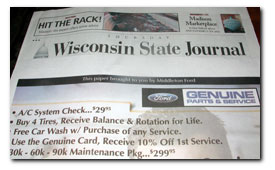
WIBA is receiving some grief from the Capital Times (part of the $120M advertising enterprise that is Capital Newspapers) over the sale of naming rights to its newsroom to Amcore Bank.
The agreements reflect the proliferation of corporate sponsorships in recent years — think FedEx Field and MCI Center — and the pressure many newsrooms feel to boost revenue. Close alliances between companies and news enterprises, however, raise a special set of issues related to journalistic integrity, ethicists say.
With journalism still under a cloud from some high-profile scandals, newsrooms must go to the greatest lengths to convince the public of their independence and credibility, said Kelly McBride, a journalism ethics expert at the Poynter Institute for Media Studies, a journalism training center.
“This undermines all the efforts we’re making to protect our credibility,” she said. “It creates the perception that the newsroom is for sale to the highest bidder.”
An informed society must understand that advertising, sponsorship or underwriting will always include influence. The real solution, from my perspective, is the ongoing disaggregation of media, with many, many more choices and a number of aggregators.
I wonder how sponsorship of a newsroom is any different than wrapping the daily newspaper in a sponsor’s first thing visible full page ad? See a local example here.
